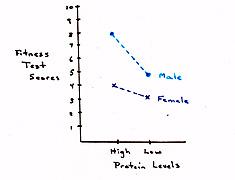| Source | SS | df | MS | F |
| Protein Level | 20 | 1 | 20.00 | 8.89 |
| Gender | 45 | 1 | 45.00 | 20.00 |
| Protein Level x Gender | 5 | 1 | 5.00 | 2.22 |
| Within | 36 | 16 | 2.25 | |
| Total | 106 | 19 | ||

There appears to be significant main effects for both protein level (F=8.89 (1,16), p<.01) and gender (F=20.00 (1,16), p<.01). There was not a significant interaction effect (F=2.22 (1,16), not significant).
Based on this data, it appears that a high protein diet results in a better fitness test score. Additionally, young men seem to have a significantly higher fitness test score than women.